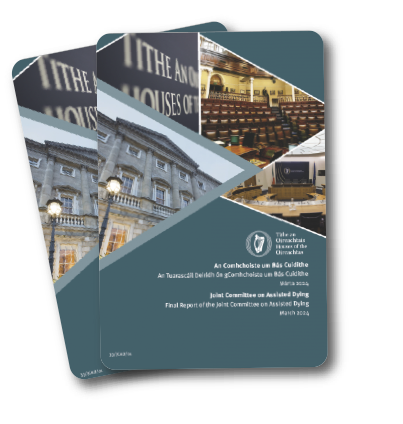Committee recommends assisted dying legislation

The Oireachtas Joint Committee on Assisted Dying has recommended that the Government introduces legislation allowing for the legalisation of euthanasia.
The Oireachtas Joint Committee on Assisted Dying was established in January 2023, and held six public meetings prior to its dissolution in March 2024.
In its final report, released on 20 March 2024 – the same day as Leo Varadkar TD announced his resignation as Taoiseach – the committee recommended that the Government “introduces legislation allowing for assisted dying, in certain restricted circumstances”, further outlining that any legislation for assisted dying may entail amendments to the Criminal Law Suicide Act 1993.
The committee closely studies several examples of states where assisted dying is already legal, albeit with differing levels of liberalisation.
On the highly liberal Swiss model, which allows for “assisting of suicide that is not for selfish motives”, the report states: “Although not centrally regulated there are certain legal requirements on doctors when prescribing a lethal dose of medication to a person who wishes to end their own life, such as, for example being satisfied that the person has capacity.”
The Swiss model also allows for foreign nationals to travel to the country to use assisted dying mechanisms.
In opposition to this, the committee recommends that eligibility for assisted dying should be limited to Irish citizens or those ordinarily resident in the State for a period of not less than 12 months.
Looking at the model in New Zealand, which legalised assisted dying in 2019, the committee heard from Kristen Good, the New Zealand Registrar (assisted dying) that, in developing the system, prioritising the development of safeguards was essential, describing it as “a race to be the safest and the toughest”.
Among the committee’s other recommendations is a call to enhance palliative care, and keep it separate from assisted dying frameworks, eligibility for assisted dying, and also the ability for medical professionals to opt out, but for this to not mean a prevention for the patient.
The committee also recommends that the Optional Protocol to the United Nations Convention on the Rights of Persons with Disabilities should be ratified as a precondition of the commencement of assisted dying legislation.
Preventing coercion
Opinion polling shows that there is a generally high level of support for the legalisation of assisted dying, also known as euthanasia.
However, one point of concern raised by stakeholders across the board was the prospect of coercion, in spite of the fact that the committee outlines prospective legislation which would make this a punishable offence.
“Any potential legislation on assisted dying provides that where a person has been proven guilty of coercion, they will have committed an offence under the Act,” the report recommends.
The report further states: “Doctors and healthcare workers involved in the provision of assisted dying be trained to the highest level possible to identify coercion when assessing or treating a patient.
“If a medical professional has been proven to have acted outside of the permitted regulations or has attempted to coerce an individual, they will have committed an offence under the potential legislation and may be held liable.
“The committee recommends the inclusion in any legislation on assisted dying of mandatory reporting to An Garda Síochána of any information or evidence concerning the issue of possible coercion in relation to assisted dying.”
Background
Assisted dying became a topic at the heart of Irish politics in 2013 following the case of the late Marie Fleming, who took a case against the State before her death later that year.
Fleming’s widower and prominent euthanasia campaigner Tom Curran described the committee’s report as a “breakthrough moment”.
Curren nonetheless criticised the recommendations of the report, hypothesising: “Would Marie qualify for this, and the answer is no.”
He said that doctors working with those with neurological conditions “are not quite prepared to give a timescale” of how long their patient has left to live, with Fleming’s doctor saying it was “impossible” to give her a prognosis.
What comes next?
Following the publication of the report, the Government is to “very closely consider” the measures recommended in the committee report. It is possible that these measures will go to referendum, although nothing has been stated thus far.
Minister for Finance Michael McGrath TD has cast doubt that the recommendations will be realised before the end of this government’s term, saying it is “ambitious that that could be done in the remainder of this government’s life”.
Committee chair Michael Healy-Rae TD and his committee colleagues Senator Rónán Mullen and Fianna Fáil’s Robert Troy TD, voted against the recommendations, while it is understood that Sinn Féin’s Pa Daly TD abstained from voting.
In a press conference in the aftermath of the report, Healy-Rae said: “Every life is worth living… Every life is a precious thing.”
This position was mirrored by Mullen, who said: “The case has not been established that we should introduce assisted dying.”
In supporting the measures outlined in the joint report, People Before Profit’s Gino Kenny TD, who served on the committee, said: “I think it is important that people, when they come to the end of their life, have a choice and they can die on their own terms.”






